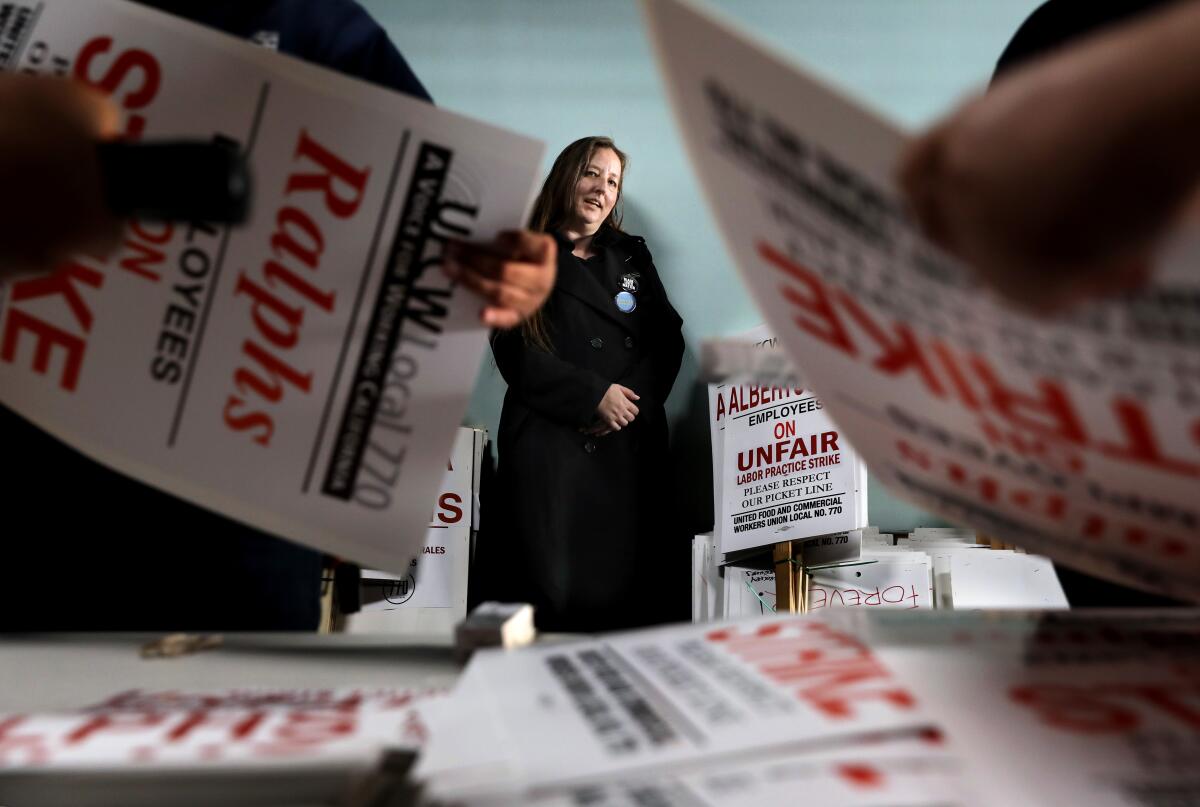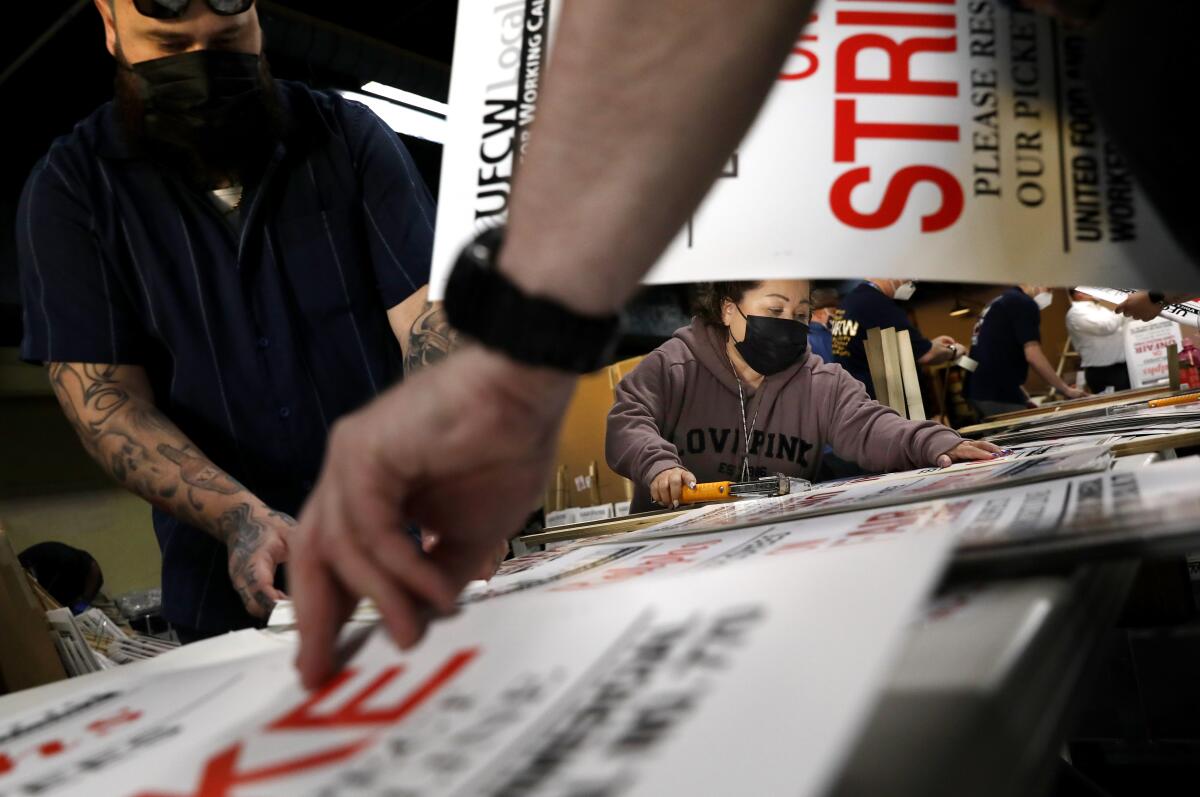A grocery worker strike was imminent. Then came a 30-hour bargaining marathon

- Share via
A union representing 47,000 Southern California grocery workers tentatively signed a new three-year contract with Ralphs, Albertsons, Vons and Pavilions, averting a strike they had authorized last week.
The contract will be put to a vote next week by rank-and-file members of seven United Food and Commercial Workers locals representing employees at 540 stores from San Diego to San Luis Obispo.
The union delayed releasing details of the agreement until members ratify it. But it praised the result, which it said included higher wages and improved benefits for essential workers who have toiled through difficult conditions during the two-year pandemic. Ninety-five percent of UFCW members voted to move ahead with a strike if supermarkets refused to substantially raise their pay.
Workers across 540 Ralphs, Albertsons, Vons and Pavilions stores vote to authorize a strike amid impasse in bargaining over wages, safety regulations.
“This is a great agreement that will help turn grocery store jobs around and make tangible improvements in our lives,” Rachel Fournier, a cashier at a Los Angeles Ralphs store and a bargaining committee member, said in a statement released by UFCW 770, which represents 18,000 workers in the Los Angeles area.
Another bargaining committee member, Manny Estrada, a pharmacy clerk at a Vons in Grover Beach, called it “a big deal. Grocery store workers have served our customers throughout the most difficult moments of our lifetime. We’ve kept the stores open and have contributed to the companies’ success. This is a well-deserved contract that we look forward to ratifying soon.”
A spokeswoman for Albertsons, which also owns Vons and Pavilions, confirmed that a tentative agreement had been reached.
Robert Branton, vice president of operations at Ralphs, said in a statement, “We are pleased that this agreement allows us to put more money in our associates’ paychecks and secures healthcare and pension plans.”

The top tier wage hike will also apply to workers at Food 4 Less, which reached an earlier settlement linking its contract to Ralphs’. Both chains are owned by Kroger, one of the nation’s largest grocery companies.
The agreement came together about 6 p.m. Monday after a 30-hour bargaining session at a hotel. Negotiators reportedly dragged patio furniture into the bargaining area to catch naps. For the first time, the bargaining included not just union officials but also working grocery clerks — a strategy that allowed members to draw on their firsthand experiences during negotiations.
UFCW’s bargaining hand was strengthened by a labor shortage that has enabled workers to switch jobs in California and across the U.S. as they seek higher wages amid a spurt of inflation.
Militancy among the rank and file was also driven by fury over their eroding wages since a devastating 2003-2004 strike spurred by the companies’ push to slash pay and benefits. In the last negotiations in 2019, UFCW workers authorized a strike, but a contract was agreed upon two months later, averting a work stoppage.
In interviews, many grocery workers pointed to Kroger Chief Executive Rodney McMullen’s 2020 compensation of $22.4 million, his highest ever, and the near-doubling of Kroger’s operating profit to $4.3 billion from 2019 to 2021, even as the companies fought extending hazard pay for workers.
Union activity is also on the rise across the country, spurred in part by the pandemic, with nurses and teachers striking over workplace conditions, and employees from companies such as Amazon and Starbucks seeking to unionize.
In the Los Angeles area, 10,284 grocery workers in Local 770 alone contracted COVID-19 over two years, according to data provided to the union by the stores. Although white-collar employees could do their jobs from home, grocery workers had to work at stores or lose their positions. Cashiers and clerks say they endured abuse from some customers when they reminded them to wear masks or stand socially distanced from one another.
Bargaining over a new contract began in January but stalled in early March. Preparations for a strike soon began on both sides, with the unions mobilizing their members and Ralphs advertising for temporary workers to cross picket lines.
Ralphs had also emailed its nonunion staffers asking who among them had truck driver licenses in anticipation of the Teamsters union refusing to drive across the lines to make deliveries.

Negotiations resumed a week ago but made little progress at first. On Saturday, a deal did not seem imminent. UFCW 770 posted a statement on its website saying the companies “have been disrespectful at the bargaining table and have barely budged in their offer.”
The union, which had filed unfair labor practice charges with the National Labor Relations Board, also said, “Both companies continue to play games at the bargaining table while committing unlawful practices that violate your legal rights as a worker.”
Ralphs responded Sunday with an equally combative statement, saying, “UFCW locals collected $23 million in membership dues from Ralphs associates, yet if their members choose to walkout, strike pay from the union would be $15 per hour.”
“Any activity by the union in the coming days, besides negotiating an offer that puts more money in our associates’ pockets is nothing but mere propaganda by UFCW,” Branton said in the statement.
The UFCW had proposed that the highest-paid longtime workers — food clerks who include cashiers and shelf stockers — get a $5 hourly raise by the end of a new three-year contract. They currently earn $22.50 an hour after five to seven years. The companies had offered $1.80.
A third of the workforce falls into the food clerk category.
The union also sought to close the gap between those higher-paid employees and another third of grocery workers — general merchandise clerks, including deli food preparers and nonfood stockers — who now earn a maximum of $17.02 an hour. The union proposed a raise of $8 an hour by the contract’s third year, saying they perform work similar to the higher-paid food clerks. The companies offered $2.
The lowest-paid third of workers, baggers and clerk’s helpers, earn slightly above the state’s $15-an-hour minimum wage, a rate the UFCW proposed to increase.
Besides substantial wage bumps, the union sought higher minimum hours for part-timers. In recent years, the supermarkets have moved more than two-thirds of their workforce to part-time status, making it hard for employees to make ends meet.
Store-level health and safety committees, which could address pandemic concerns, were also on the bargaining table.
“I’m 35 years old and I can’t afford my own apartment,” said Raymond Smith, who fulfills online grocery orders and ferries them to customers’ cars at a Ralphs in Sunland. He makes $18.25 an hour after four years, and must live with his sister and brother-in-law, he said.
“During the pandemic, we all got to see that we were just numbers on a page. We learned the company doesn’t care. Honestly, we’re not asking for that much. We just want to be able to live and be happy and not have our families broken up because our work life is so hard.”
More to Read
Inside the business of entertainment
The Wide Shot brings you news, analysis and insights on everything from streaming wars to production — and what it all means for the future.
You may occasionally receive promotional content from the Los Angeles Times.












